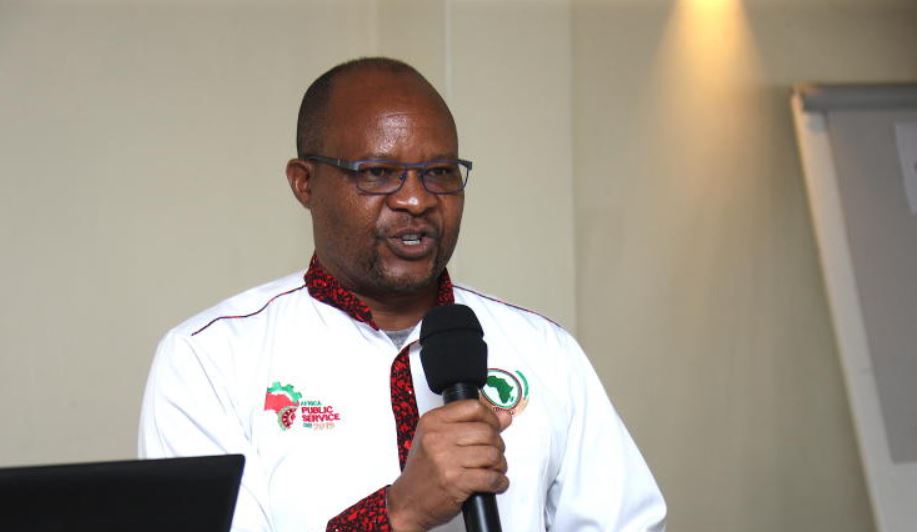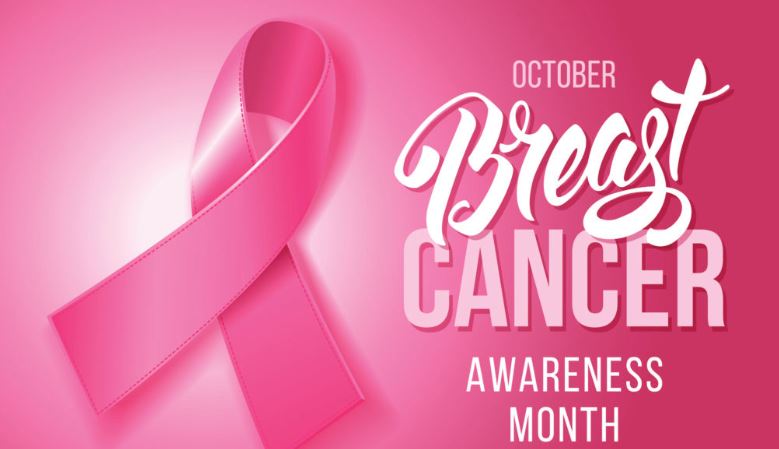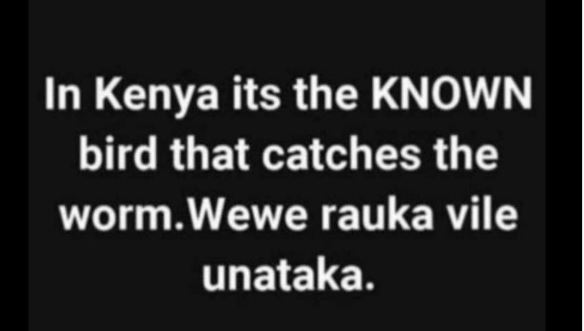 Dr. Roy Mugiira, Acting Chief Executive Officer of the National Biosafety Authority (NBA), speaks about GMO foods and their alleged cancer risks.
Dr. Roy Mugiira, Acting Chief Executive Officer of the National Biosafety Authority (NBA), speaks about GMO foods and their alleged cancer risks.
You are the CEO of the National Biosafety Authority (NBA). What is your mandate?
This Authority is established by the National Safety Act to regulate the area of business in the conduct of genetically modified organisms. We exist to assure safety of GMOs to human health, animal health and the environment in general.
In layman’s terms, what are GMO foods and why are Kenyans terrified of them?
GMOs scare many Kenyans but this should not be the case. Modern biotechnology has been with us for ages. It is not a new thing. In the 1970s and 80s, for instance, we used to breed plants to get characters that we wanted in the next generation. For example, we would cross early maturing plants with highly yielding maize so that the offspring would carry the characteristics of both early maturing and highly yielding maize. Usually, that takes a long time. It was basically trial and error since the outcome was not always guaranteed.
Did these experiments yield fruit?
Oh yes. In the early 90s, scientists were able to identify genes that make a plant early yielding and another one early maturing. What they were able to do was to cut the gene of an early maturing plant and paste it in the gene of the early yielding plant to create a plant that is early maturing and early yielding. That is what is known as modern biotechnology. However, the technology went a step further where it was possible to cross genes from unrelated organisms, for instance moving genes from a bacterium and putting it in maize to make it drought and disease resistance. The resulting plants, which carry genes from elsewhere is what is called genetically modified organisms.
President Kibaki’s government banned the importation of GMO foods in 2012. What was the thinking behind the ban?
The ban was largely informed by a study done by a group of French scientists who published research purporting to show that mice fed on GMO maize developed tumours and was therefore cancerous. They published the research in scientific journals as well as the media.
The findings were magnified by the media with photographs of mice that were swollen. This issue became sensational in different parts of the world. Then Cabinet minister for Public Health, Beth Mugo persuaded her cabinet colleagues to ban GMO foods based on these reports.
Was this research legit?
The study by the French scientists were reanalysed and found to be a very, very fluid kind of science. They used mice that would ordinarily develop tumours even if they were affected by anything since they were programmed to do so by scientists who wanted to understand how cancer develops.
The publication was pulled down and the scientists involved came forward to testify that their methodology was not correct. The study has been discredited by scientists all over the world, and even here in Kenya.
Critics complained that the ban was based on activism as opposed to science…
There is a negative perception from the general public on the safety of GMO foods which is based on wrong assumptions. This is due to lack of proper awareness and education. Let me reiterate here that there is no verifiable scientific evidence that links GMO to cancer. We can say that it was a result of sensational false reports that have since been discredited.
Would the hybrid maize planted in Kenya and the varieties of improved vegetables and fruits planted and consumed in Kenya be classified as GMO foods?
No, there is that assumption that the big tomatoes you see on the market or chicken that grows faster is GMO. At the moment in Kenya, the only GMO GROWN is BT Cotton and nothing else. Maize and other crops are however on the way. But as we check the safety of these crops, we also check their relevance in our socioeconomic situation. For instance, our focus will be crops that are drought tolerant and high yielding.
What happened in countries that had banned these foods out of fear that they cause cancer?
Many countries that had banned GMO foods have since lifted the ban. This is because most of them did their own studies and affirmed that the products were safe from a scientific perspective. As NBA, we have checked, analysed and confirmed that the products are safe. Let’s encourage innovation in agricultural production.
In a conversation that I have taken part in, they are talking of other means of enhancing agricultural production which to me is also correct. They include irrigation farming, better ways of managing ecosystems, mitigating post-harvest losses, application of fertilizer and several others. These combinations of strategies will certainly help in mitigating the problems we are having in food production. However, this GMO technology is an added tool in that package. It is not coming to replace the alternative strategies. It does not mean these other things should stop.
To what extend can this technology be abused and what safeguards are required?
Before the GMO crop is released, we do carry out a case by case assessment of safety of GMO products to ensure that they are fit for human consumption. For instance, in the case of maize, we have to compare the GMO maize and the non-GMO maize to ascertain that all chemical compositions are aligned to the National database to remove allergic proteins. This is the same case with toxicity whereby proteins that cause toxins are identified through sequencing and removed.
We also check the potential of the crop to become a super weed, cause environmental problems, ability to infect other plants and so forth. We then take the product to Kenya Bureau of Standards for quality assessment and then to NEMA for environmental and ecological viability. Like any other technology, we also understand there are mischievous people who are likely to abuse this technology and that is why we exist as NBA as a safeguard.
The royal botanical gardens Kew in the UK have a seed bank of Kenyan indigenous plants. What would it take to establish one here?
There have been plans of establishing the National Biological Resource Centre, not only for seeds but also micro-organisms that are endemic to Kenya. We also have a seed bank at the Kenya Agricultural and Livestock Research Organization (Kalro) and you can approach them for more professional comments on this area. We are very keen about a seed bank so that we don’t lose the diversity of our crops.








